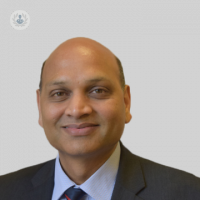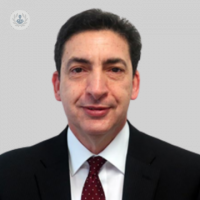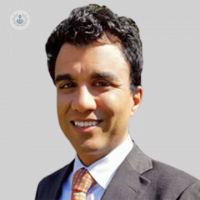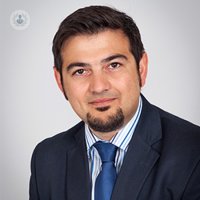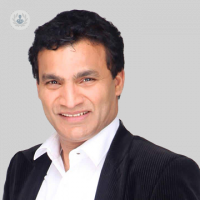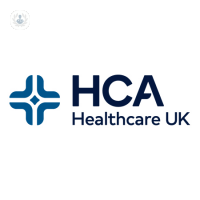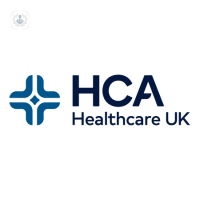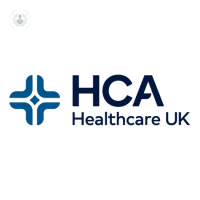What is a slipped disc?
The spine or backbone is made up of segments of bone (vertebrae) separated with fibrocartilaginous discs, which provide flexibility and act as shock-absorbers.
A slipped disc is when one of these soft cushions of tissue pushes outwards. They are often painful, due to the fact that the spinal cord (part of the central nervous system) passes through the middle of them. This means that when a disc herniates (slips), it often puts pressure on nerves.
Slipped discs can occur in the cervical (neck) region, the thoracic (middle back) region, and the lumbar (lower back) region of the spine.
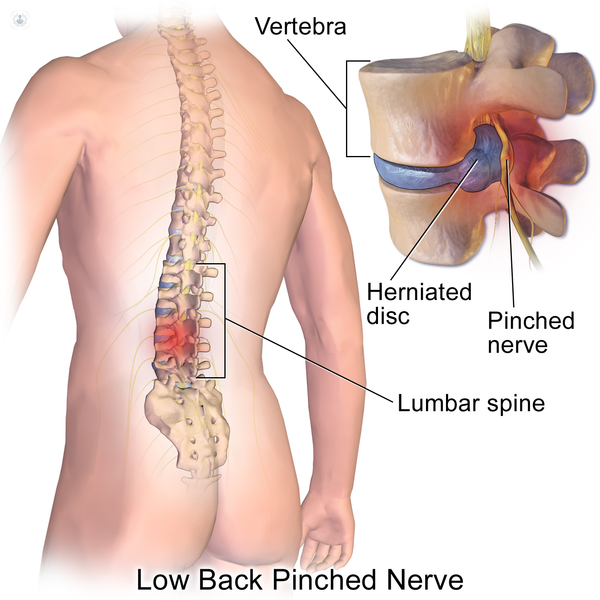
Prognosis of a slipped disc
In the majority of cases, a slipped disc will heal itself with rest, gentle exercise, and painkillers. It is advisable to see a doctor if you are in any pain or experiencing the symptoms listed below and follow their advice. In some cases, further treatment will be required.
Symptoms of a slipped disc
Symptoms of a herniated disc can vary – some people may experience severe problems due to the compression of nerves, while others may never even realise they have slipped a disc. Potential symptoms include:
- Low back pain
- Neck pain
- Difficulty straightening or bending the back
- Numbness or tingling in the back, shoulders, arms, hands, legs or feet
- Muscle weakness
- Sciatica (pressure on the sciatic nerve) – this may involve pain in the legs, hips, or buttocks.
What are the causes of a slipped disc?
Slipped discs can occur for a number of reasons, including:
- Ageing
- Straining during exercise
- Bad technique when lifting heavy objects
- Vibration caused by driving or operating machinery
- Inactivity and/or being overweight
Can a slipped disc be prevented?
The best preventative steps to take are:
- Stay fit and do regular exercise
- When lifting heavy objects, use a safe technique, i.e. not bending or twisting the back.
Treatments for a slipped disc
Depending on the severity of the slipped disc, the doctor may recommend:
- A stronger painkiller
- A muscle relaxant
- A steroid injection
- Physiotherapy
- Surgery (this is usually only considered if other measures have been ineffective and symptoms like numbness are getting worse)
Which type of specialist treats a slipped disc?
Orthopaedic surgeons, particularly those with a specialist interest in spinal surgery treat conditions of the spine, such as a slipped disc.
07-02-2019 04-27-2023Slipped disc
Mr Sanjay Dhiran - Orthopaedic surgery
Created on: 07-02-2019
Updated on: 04-27-2023
Edited by: Conor Dunworth
What is a slipped disc?
The spine or backbone is made up of segments of bone (vertebrae) separated with fibrocartilaginous discs, which provide flexibility and act as shock-absorbers.
A slipped disc is when one of these soft cushions of tissue pushes outwards. They are often painful, due to the fact that the spinal cord (part of the central nervous system) passes through the middle of them. This means that when a disc herniates (slips), it often puts pressure on nerves.
Slipped discs can occur in the cervical (neck) region, the thoracic (middle back) region, and the lumbar (lower back) region of the spine.

Prognosis of a slipped disc
In the majority of cases, a slipped disc will heal itself with rest, gentle exercise, and painkillers. It is advisable to see a doctor if you are in any pain or experiencing the symptoms listed below and follow their advice. In some cases, further treatment will be required.
Symptoms of a slipped disc
Symptoms of a herniated disc can vary – some people may experience severe problems due to the compression of nerves, while others may never even realise they have slipped a disc. Potential symptoms include:
- Low back pain
- Neck pain
- Difficulty straightening or bending the back
- Numbness or tingling in the back, shoulders, arms, hands, legs or feet
- Muscle weakness
- Sciatica (pressure on the sciatic nerve) – this may involve pain in the legs, hips, or buttocks.
What are the causes of a slipped disc?
Slipped discs can occur for a number of reasons, including:
- Ageing
- Straining during exercise
- Bad technique when lifting heavy objects
- Vibration caused by driving or operating machinery
- Inactivity and/or being overweight
Can a slipped disc be prevented?
The best preventative steps to take are:
- Stay fit and do regular exercise
- When lifting heavy objects, use a safe technique, i.e. not bending or twisting the back.
Treatments for a slipped disc
Depending on the severity of the slipped disc, the doctor may recommend:
- A stronger painkiller
- A muscle relaxant
- A steroid injection
- Physiotherapy
- Surgery (this is usually only considered if other measures have been ineffective and symptoms like numbness are getting worse)
Which type of specialist treats a slipped disc?
Orthopaedic surgeons, particularly those with a specialist interest in spinal surgery treat conditions of the spine, such as a slipped disc.
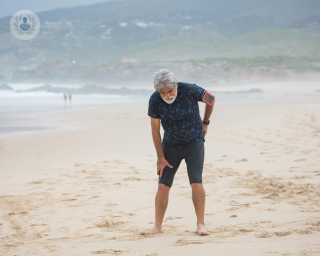

Surgery for a lumbar disc prolapse (slipped disc)
By Mr Fahid Rasul
2025-01-28
Surgery for a lumbar disc prolapse, also known as a herniated or slipped disc, is typically recommended when non-surgical treatments have failed, or the condition is causing severe symptoms like persistent pain, significant nerve compression, or loss of bladder or bowel control. The goal of surgery is to relieve pressure on the affected nerves, alleviate pain and restore mobility and quality of life. See more
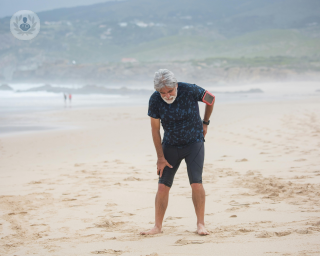

Disc and back pain: A neurosurgeon's perspective
By Mr Samih Hassan
2025-01-28
Disc and back pain are common conditions that can significantly impact daily activities and overall quality of life. Understanding the relationship between these conditions and neurosurgery is crucial for patients seeking effective treatment options. Leading consultant neurosurgeon Mr Samih Hassan provides comprehensive information about disc and back pain from a neurosurgical perspective in this article. See more
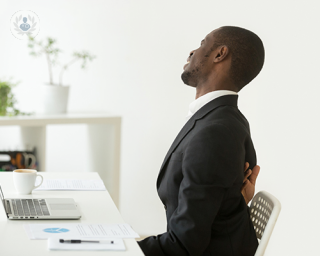

Recovering from a slipped disc
By Mr G Michael Hess
2025-01-28
Spinal injuries can be very serious. One more common injury is a slipped disc - when the spinal discs that sit between the vertebrae herniate, or slip out of place. We asked leading orthopaedic surgeon Mr G. Michael Hess the important questions. See more


5 different types of spondylolisthesis
By Mr David Bell
2025-01-28
When a bone in the vertebra slips out of place it is known as a condition called spondylolisthesis. There are, however, five types of this condition and none of which should be confused for a slipped disc. Leading neurosurgeon Mr David Bell explains the differences and how it's treated. See more
Experts in Slipped disc
-
Mr Habib Ellamushi
NeurosurgeryExpert in:
- Back pain
- Neck pain
- Slipped disc
- Sciatica
- Brain tumour
- CyberKnife
-
Mr Jaykar Panchmatia
Orthopaedic surgeryExpert in:
- Back pain
- Low back pain
- Sciatica
- Slipped disc
- Spinal osteoarthritis
- Trapped nerve
-
Mr Sanjay Dhiran
Orthopaedic surgeryExpert in:
- Back pain
- Neck pain
- Arm pain
- Minimally invasive spinal surgery
- Slipped disc
- Sciatica
-
Mr Cyrus Jensen
Orthopaedic surgeryExpert in:
- Slipped disc
- Sciatica
- Lumbar spinal surgery
- Back pain
- Neck pain
- Arm pain
-
Mr Mangattil Rajesh
Orthopaedic surgeryExpert in:
- Back pain
- Neck pain
- Sciatica
- Minimally invasive surgery herniated disc
- Slipped disc
- Discectomy
- See all

The Portland Hospital - part of HCA Healthcare
The Portland Hospital - part of HCA Healthcare
205 - 209 Great Portland St. W1W 5AH
No existe teléfono en el centro.
By using the telephone number provided by TOP DOCTORS, you automatically agree to let us use your phone number for statistical and commercial purposes. For further information, read our Privacy Policy
Top Doctors

The Outpatients and Diagnostic Centre at 30 Devonshire Street (HCA)
The Outpatients and Diagnostic Centre at 30 Devonshire Street (HCA)
30 Devonshire St, London W1G 6PU
No existe teléfono en el centro.
By using the telephone number provided by TOP DOCTORS, you automatically agree to let us use your phone number for statistical and commercial purposes. For further information, read our Privacy Policy
Top Doctors

Platinum Medical Centre (HCA)
Platinum Medical Centre (HCA)
15-17 Lodge Road, NW8 7JA
No existe teléfono en el centro.
By using the telephone number provided by TOP DOCTORS, you automatically agree to let us use your phone number for statistical and commercial purposes. For further information, read our Privacy Policy
Top Doctors
-
The Portland Hospital - part of HCA Healthcare
205 - 209 Great Portland St. W1W 5AH, Central LondonExpert in:
- Neurological spinal surgery
- Orthopaedic spinal surgery
- Maternity care
- Pregnancy
- Scoliosis
- In vitro fertilisation (IVF)
-
The Outpatients and Diagnostic Centre at 30 Devonshire Street (HCA)
30 Devonshire St, London W1G 6PU, Central LondonExpert in:
- Orthopaedic surgery
- Orthopaedic spinal surgery
- Musculoskeletal pain
- Musculoskeletal ultrasound
- Spinal stenosis
- Spinal injections
-
Platinum Medical Centre (HCA)
15-17 Lodge Road, NW8 7JA, Central LondonExpert in:
- Digestive
- Cancer
- Orthopaedic surgery
- Diagnostic Imaging
- Spine
- Physiotherapy
- See all
- Most viewed diseases, medical tests, and treatments
- Osteoporosis
- Trigeminal neuralgia
- Alzheimer's disease
- Cluster headaches
- Tension headache
- Chronic headache
- Ulnar nerve entrapment
- Peripheral nerve block
- Peripheral neuropathy
- Joint pain
